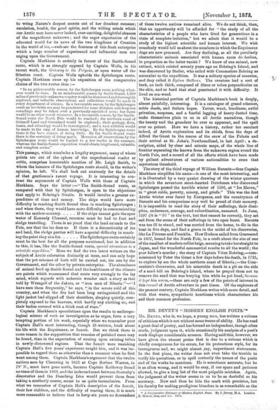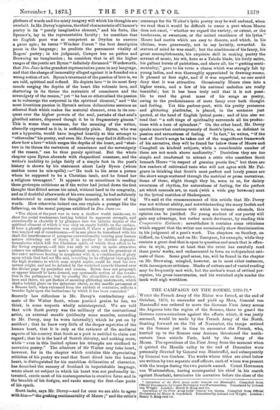MR. DEVEY'S "MODERN ENGLISH POETS."
Mn. DEVEY, who is, we hope, a young man, has written a volume of criticism which is not without some traces of ability. He has read a great deal of poetry, and has formed an independent, though often crude, judgment upon it, while occasionally his analysis of a poet's work displays considerable acumen. Having said this, however, we have given the utmost praise that is due to a volume which is chiefly conspicuous for its errors, for its pretentious style, for its incongruous and, we might almost :say, impertinent statements. In the first place, the writer does not even take the trouble to verify his quotations, or to spell correctly the names of the poets and of the works he mentions. He is sometimes accurate, but he is as often wrong, and it would be easy, if our space and patience allowed, to give a long list of the most palpable mistakes. Again, the judgment of the writer seems to us to be as doubtful as his accuracy. Now and then he hits the mark with precision, but his faculty for making prodigious blunders is as remarkable as the • A Comparative Estimate of Modern English Poets. By .1...Davey, M.A. London E. Moxon, Son, and Co. 1873.
plethora of words and the misty imagery will which his thoughts are overlaid. In Mr. Devey's opinion, the chief characteristic of Chaucer's poetry is its "purely imaginative element," and his forte, like Spenser's, lay in the representative faculty ; he considers that no English poet was so competent as Dryden to execute a great epic ; he terms "Windsor Forest" the best descriptive poem in the language ; he predicts the permanent vitality of Rogers' poetry ; in his judgment, Cowper has no pathos and Browning no imagination ; he considers that in all the higher ranges of the poetic art Byron" infinitely distanced" Wordsworth,
that Don Juan is the grandest representative poem in any language, and that the charge of immorality alleged against it is founded on a wrong notion of art. Byron's treatment of the passion of love is, we are told, spiritual and refined. He depicts love "in its most fiery moods surging the depths of the heart like volcanic lava, and shattering in its throes the restraints of conscience and the sovereignty of the reason," yet "he has so etherealised the passion as to submerge the corporeal in the spiritual element," and "the most licentious passion in Byron's serious delineations assumes an ethereal flush which makes the material element, even in its con-
quest over the higher powers of the soul, partake of that sours glorified nature, dispersed though it be in fragmentary gleams." This is worse than nonsense, for the meaning of the writer, absurdly expressed as it is, is sufficiently plain. Byron, who was not a hypocrite, would have laughed heartily at this attempt to "etherealise" his poetry, and even Mr. Davey may find it difficult to show how a love" which surges the depths of the heart, and "shat- ters in its throes the restraints of conscience and the sovereignty of the reason," can be thus purely spiritual. But the whole chapter upon Byron abounds with rhapsodical nonsense, and the writer's inability to judge fairly of a simple fact in the poet's history is shown by his statement about Lady Byron (whose maiden name he mis-spells) :—" He took to his arms a person whom he supposed to be a Christian lamb, and he found her a religions termagant." It appears to us sometimes in reading these grotesque criticisms as if the writer had jotted down the first
thought that flitted across his mind, without heed to its congruity, and as if doubtful afterwards of his own meaning, he had sedulously endeavoured to conceal the thought beneath a number of big words. How otherwise indeed can one explain a passage like the following, on the moral purpose exhibited in Don Juan :— "The object of the poet was to turn a shallow world inside-out, to show the social weaknesses larking behind its apparent strength, and occasionally to electrify it by glimpses into the infinite depths of the spiritual element of which it was only an empty bubble on the surface. If here a ghostly pretension was exposed, if there a political blunder was laughed out of countenance,—if in one place he transfixed with his shaft the heartlessness of pompous conventionality turning poor human nature shivering out of doors, if in another he derides dogmatic formularies which kill the Christian spirit, of which they affect to be the living exponent,—all this was only to array in more attractive colours the sublimities of man's spiritual nature, and the grandeur of the outer universe beating in symphony with it a combination of glory upon which God had set His seal, revealing in its effulgent hieroglyphs the high destinies to which man might aspire, could he read his own nature aright, and not be deluded by the wretched scrawls blurred over the divine page by prejudice and custom. Byron does not propound, or appear himself to have formed, any systematic notion of the revela- tion in the palimpsest ; but by erasing the absurdities on the surface, here and there, we get flashes of meaning glittering underneath, which shed a baleful glare on the delusions above, as the marble pavement of a Roman bath, when exhumed from the rubbish of centuries, reflects a broader light upon the barbarisms by which it has been concealed."
Scarcely less ridiculous is Mr. Devey's contradictory esti- mate of Sir Walter Scott, whose poetical genius he has, we think, in some respects wholly misinterpreted. We are told that with Scott poetry was the millinery of the conventional artist, an external mantle (evidently some mantles, according
to Mr. Devey, may be worn internally) which he put on by accident ; that he knew very little of the deeper mysteries of the human heart, that it is only as the reviewer of the mediaival aspects of his country that Scott as a poet is entitled to claim our regard ; that he is the bard of Scotch chivalry, and nothing more, while "even in this limited sphere his triumphs are confined to narrative poetry." The admirers of Sir Walter may take heart, however, for in the chapter which contains this depreciating
criticism of his poetry we read that Scott dived into the human heart, is distinguished for his matchless delineation of character, has described the scenery of Scotland in imperishable language, wrote about no subject in which his heart was not profoundly in- terested, excels most of his contemporaries in creative force and in the breadth of his designs, and ranks among the first-class poets of his epoch.
Scott lacks, says Mr. Devey—and for once we are able to agree with him—" the gushing sentimentality of Moore ;" and the critic's
contempt for Sir Walter's lyric poetry may be well endured, when we read that it would be difficult to name a poet whom Moore does not excel, "whether we regard the variety, or extent, or the tenderness, or sweetness, or the united excellence of his lyrics." Moore had merits which are easy to discern, and which, in his lifetime, were generously, not to say lavishly, rewarded. In stature of mind he was small; but the nimbleness of his fancy, his great accomplishments, his exquisite skill in making poetry the servant of music, his wit, keen as a Toledo blade, his lively satire, his gallant bursts of patriotism, and above all, his "gushing senti- mentality," gave to his verse a charm which was strongly felt by young ladies, and was thoroughly appreciated in drawing-rooms. It pleased at first sight, and if it was superficial, no one could deny that it was attractive. Occasionally Moore rises into a higher strain, and a few of his national melodies are really beautiful ; but it has been truly said that it is not possi- ble to read the great mass of his songs as poetry, owing to the predominance of mere fancy over both thought and feeling. Yet this parlour-poet, with his pretty pretences and glittering platitudes, is placed, in the sentence just quoted, at the head of English lyrical poets ; and of him also we read that "a soft tinge of spirituality surrounds all his produc- tions with a haze of splendour." On the other hand, Mr. Devey speaks somewhat contemptuously of Scott's lyrics, as deficient in passion and earnestness of feeling. "In fact," he writes, "if the beat of Scott's songs be taken out of the magnificent framework of his narrative, they will be found far below those of Moore and Campbell on kindred subjects, while a considerable number of them are not much above mediocrity." Doubtless they are too simple and unadorned to attract a critic who considers Scott beneath Moore "in respect of genuine poetic fire," but there are few readers of cultivated taste who will not agree with Mr. Pal- grave in thinking that Scott's most perfect and lovely poems are the short songs scattered through the metrical or prose narratives. Some of these, slight though they be, seem to us, for dainty sweetness of rhythm, for naturalness of feeling, for the perfect art which conceals art, to rank (with a wide gap between) next to the lyrical snatehes of Shakespeare.
We said at the commencement of this article that Mr. Devey was not without ability, and notwithstanding the many foolish and Contradictory utterances with which his volume abounds, this opinion can be justified. No young student of our poetry will gain any advantage, but rather much detriment, by reading this Comparative Estimate; nevertheless it contains some criticisms which suggest that the writer can occasionally show discrimination in his judgment of a poet's work. The chapters on Southey, on Gifford, on Crabbe, and on Mr. Tennyson, for example, while they contain a great deal that is open to question and much that is offen- sive in style, prove at least that the critic has carefully read these poets' works, and endeavoured to form an independent esti- mate of them. Some good sense, too, will be found in the chapter on Mr. Browning, mingled, however, as in most other instances, with incompetent criticism. Marks of culture and of varied reading may-be frequently met with, but the author's want of critical per- ception, his gross inaccuracies, and his wretched style render the book well nigh worthless.



































 Previous page
Previous page